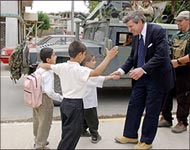400,000 lose jobs in Iraq disband order
Only hours after the Security Council voted to end the 13-year-old sanctions against Iraq, the US administrator on Friday abolished the defence and information ministries, military and security courts.
 |
| Bremer: setting up a new state apparatus |
The administrator, Paul Bremer’s, decision will mean the sacking of more than 400,000 soldiers and public employees.
“The Coalition Provisional Authority plans to create, in the near future, a new Iraqi corps. This is the first step in forming a national self-defence capability for a free Iraq,” a statement by the US-led administration said.
The Iraqi army will be rebuilt from scratch. “Under civilian control, that corps will be professional, non-political, militarily effective and representative of all Iraqis,” it said.
Negative reaction
The order disbands the elite Republican Guards and the regular army. It suspends conscription and turns property of the dissolved entities over to the US-led administration.
Aljazeera correspondent in Baghdad Tayseer Alouni reported that people reacted negatively to Bremer’s order.
 |
| Saddam Hussein’s men: frozen in time |
A small demonstration was held in Baghdad against the US decision. Protesters chanted slogans against Bremer’s action and demanded the formation of a government of Iraqis in the country.
However, defending it, the US said “These actions are part of a robust campaign to show the Iraqi people that the Saddam regime is gone, and will never return.”
The Iraqi army has in practice already been disbanded by the US-led invasion that toppled president Saddam Hussein’s government last month.
The US administration had earlier banned the ruling Baath Party and vowed to prevent the party’s top officials from holding public office.
The new United Nations resolution which was the impetus for the US move allows it to use Iraq’s abundant oil resources to finance reconstruction.
Meanwhile, the UN decision to lift sanctions by a vote of 14-0 was greeted with relief and joy in Basra. The crackle of AK-47 fire echoed over the rooftops in Iraq’s second biggest city and tracer bullets shot into the sky.
“The sanctions are over,” said one Iraqi youth, standing with a Kalashnikov on a street corner. “God willing, things will be better now.”
The sanctions were imposed shortly after Saddam’s troops invaded Kuwait in August 1990.